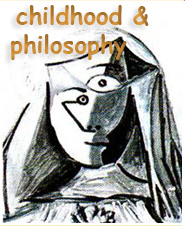the dignity of the future is inviolable: intergenerational philosophical dialogue in the work of gareth matthews, in conversation with hannah arendt and emmanuel lévinas
Keywords:
Subjektiver Zeitbegriff (H. Arendt, E. Lévinas), Phänomenologische Kindheitsforschung, Philosophische Gespräche mit Kindern (G. Matthews)Abstract
This paper aims to show how certain theories about children disregard the innovation and peculiar otherness of children’s thoughts and actions. By overlooking these qualities, we usurp the space of the future, which does not belong to us, but to the next generation. Refering to the theories of the “fresh start” (H. Arendt) and the “diachrony of time” (Lévinas), I argue that subjective time is not merely the continuation of the past. Of course, children are always born into an already existing world, which they absorb and continue. But each child’s birth is also an opportunity for a new beginning. The freedom of the child breaks with the monotonous continuity of history. Each child is a departure into an innocent world. I will consider the ideas of Gareth Matthews in arguing that philosophical dialogue with children connects to capacities for their innovation and otherness, and that philosophizing with children creates a chiasmic space.Downloads
Download data is not yet available.
Downloads
Published
2012-02-08
How to Cite
WEBER, Barbara. the dignity of the future is inviolable: intergenerational philosophical dialogue in the work of gareth matthews, in conversation with hannah arendt and emmanuel lévinas. childhood & philosophy, Rio de Janeiro, v. 1, n. 2, p. 375–394, 2012. Disponível em: https://www.e-publicacoes.uerj.br/childhood/article/view/20462. Acesso em: 21 jul. 2025.
Issue
Section
articles




